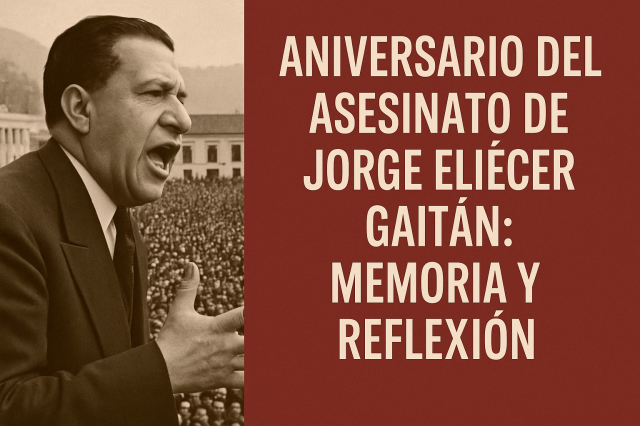April 9 marks one of the most shocking events in Latin American political history: the assassination of Colombian leader Jorge Eliécer Gaitán , an event that changed the course of Colombia and left profound scars on the continent. Although this event occurred in another country, its significance transcends borders and offers important lessons for the democratic and social memory of Latin American peoples, including Peru.
Who was Jorge Eliécer Gaitán?
Jorge Eliécer Gaitán was a lawyer, politician, and orator born in Bogotá in 1903. His passionate speech and commitment to the working classes made him one of Colombia's most beloved leaders.
He was considered a symbol of social change , a defender of workers' rights, and a promoter of more equitable justice. Gaitán dreamed of a more democratic, less elitist, and more people-oriented Colombia—ideas that resonated with social movements throughout Latin America.
The political and social context of his time
During the first half of the 20th century, Colombia experienced a period of strong political tensions between liberals and conservatives. Social inequality, centralism, and the exclusion of the majority marked the country's political life.
Gaitán represented hope for the popular sectors seeking profound transformation. His leadership grew to the point that, in 1948, he was the leading candidate to win the presidency.
April 9, 1948: The day that changed history
At 1:00 p.m. on April 9, 1948 , Gaitán was assassinated in downtown Bogotá. The crime sparked a wave of protests and violence known as "El Bogotazo," which shook the capital and marked the beginning of a long period of internal conflict in Colombia.
The assassination not only cut short the life of a leader, but also the hopes of millions of people who saw in him a path to social justice. His death left a deep wound in Latin American history, comparable to that of figures like Víctor Raúl Haya de la Torre in Peru, who also advocated for social change from a grassroots and democratic perspective.
The Bogotazo and its impact on Latin America
The Bogotazo was not just a Colombian revolt: it was an expression of popular discontent spreading across the continent. In several countries, intellectuals and political leaders saw it as a symbol of the confrontation between traditional elites and emerging popular movements.
In Peru, Gaitán's figure inspired various thinkers and activists from APRA and other social movements, who shared his vision of a more just and sovereign Latin America.
This ideological connection reinforces the idea that the continent's historical processes are deeply intertwined.
Lessons for Latin American memory
Remembering the assassination of Jorge Eliécer Gaitán is not only a historical exercise, but also an act of reflection on the current challenges facing our democracies.
His legacy invites us to think about current issues such as:
Social inequality and political exclusion.
The importance of ethical and people-friendly leadership.
The value of education and social justice as drivers of change.
The need to preserve historical memory to avoid repeating the mistakes of the past.
Jorge Eliécer Gaitán and his connection with Peruvian thought
Although Gaitán was Colombian, his ideas resonated in 20th-century Peruvian thought. Figures such as José Carlos Mariátegui and Víctor Raúl Haya de la Torre shared his humanist vision of Latin American socialism, based on social justice and the identity of the people.
This ideological coincidence makes the anniversary of his assassination an opportunity to reflect on the shared history between Peru and Colombia , countries that have fought—each in their own way—to achieve more just and democratic societies.
How Gaitán's murder is remembered today
Every April 9, Colombia commemorates the National Day of Remembrance and Solidarity with the Victims , a date that coincides with the assassination of Gaitán. This day seeks to pay tribute to all victims of the armed conflict and promote national reconciliation.
Memorial events, talks, and exhibitions honoring his legacy are held in schools, universities, and cultural venues. On social media, the hashtag #GaitánVive often accompanies posts highlighting his thought and historical impact.
